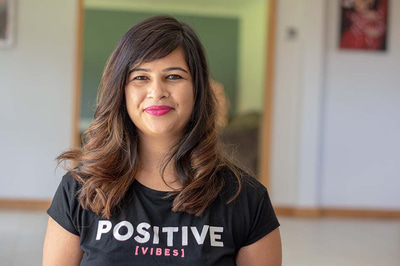- OT
- Professional support
- Optical organisations
- Workforce wellbeing
Locum optometrist guide
Workforce wellbeing
How can locum optometrists maintain balance during times of personal and professional uncertainty? OT talks to Northamptonshire optometrist and mindfulness coach, Sheena Tanna-Shah

19 December 2020
COVID-19 has brought unprecedented challenges to all sectors.
Following the UK lockdown in March, many locum optometrists who previously had full diaries were left with little or no work.
While bookings picked up following the resumption of routine appointments in June, practitioners have had to adapt to a new way of working with the lingering uncertainty about the potential for future regional and nation-wide lockdowns.

“Optometrists who are usually used to security, routine and structure have found themselves in challenging and rapidly changing situations over a short period of time. This can lead to feelings of being overwhelmed, worried, fearful and anxious,” she added.
Research published by the Office for National Statistics in June highlighted that 69% of adults were very or somewhat worried about the effect that COVID-19 was having on their life, while 44% reported that the pandemic was having an effect on their wellbeing.
The most common issue affecting wellbeing was feeling worried about the future (63%), followed by feeling stressed or anxious (56%), and feeling bored (49%).
Within optometry specifically, the AOP Peer Support Line received a steep increase in demand following the March lockdown in the UK, with the number of calls rising by 250% compared to the same period last year.
Johnson and Johnson Vision (JJV) professional education and development manager for UK and Ireland, Sheetal Patel, highlighted that the pandemic has “undoubtedly” had a significant impact on wellbeing due to uncertainty.
“More than ever it is important for us to support the eye care community in any way we can,” she emphasised.
“Providing support to help with the health and wellbeing of all those affected helps to form a more cohesive community where nobody feels isolated or alone at this time and also encourages understanding and appreciation for what we are all facing,” Ms Patel added.
Since the outbreak of the pandemic, JJV has delivered virtual education sessions to keep eye care professionals engaged and to avoid feelings of isolation.
“As well as delivering our own educational CET sessions to all eye care professionals we also partnered with the AOP to deliver a number of webinars around health and wellbeing specifically,” Ms Patel highlighted.
A seven-part series produced in partnership between JJV and the AOP explored topics from How to Manage Fear and Self-Doubt to Wellbeing For Working Parents During COVID.
Sharing her wellbeing tips for fellow optometrists, Ms Tanna-Shah highlighted the importance of communication.
She encouraged practitioners to discuss any worries – whether they centre around personal protective equipment, testing times or what the ‘new normal’ looks like.
“We often think we are the only ones thinking and feeling the way we do,” Ms Tanna-Shah shared.
“It’s most likely everyone has felt some of the worries you are experiencing, and once you share those thoughts and questions you can start getting the support,” she added.
For optometrists who are not working, Ms Tanna-Shah highlighted the benefits of staying physically active with the release of endorphins that exercise brings.
“It’s easy to slow down when there’s no structure to the day, but ensure you set time aside to keep moving,” she said.
Taking part in an activity that isn’t related to work or looking for work can also help to maintain balance, Ms Tanna-Shah shared.
“Do something to switch off and have a break, whether that’s reading a book, picking up a hobby or going for a walk,” she said.
Calm by the clock
Spare time? Sheena shares her wellbeing tips
5 minutes: meditate using an app such as Calm, Headspace or Insight Timer for inner peace and balance
30 minutes: get moving. You could take up the NHS Couch to 5k programme, complete a home workout, try yoga or dance around the living room
One hour: Take time for a hobby or look for a new one, from cooking to painting to learning a language or musical instrument. The last two activities can also be an opportunity to connect with someone else and do it together (with social distancing in place if you are from different households).
AOP support
The AOP Peer Support Line (0800 870 8401) is a confidential free support line for members and non-members at any stage of their optical career. Optometrists are able to discuss concerns with a trained, empathetic peer who recognises the pressures of optical practice.
Calls will be answered 24 hours a day, by an external answering service, with volunteers on duty to return calls between 8am and 8pm.
Three ways to stay connected during a time of social isolation
Johnson and Johnson Vision professional education and development manager for UK and Ireland, Sheetal Patel, provides guidance on avoiding professional isolation
1. Join like-minded communities – peer groups of locums who share your unique circumstance and support each other through exchanging experiences
2. Stay close to professional organisations who can keep you up to date on changes and guidance
3. Continue with your professional development and CET through dedicated educational opportunities specifically designed for locums.

